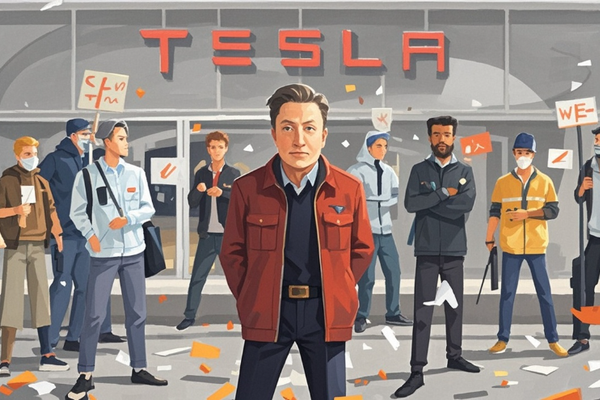马斯克的困局:政治漩涡下的特斯拉
特斯拉的“寒冬”:数据背后的隐忧
特斯拉,这家一度被视为电动汽车市场领头羊的企业, recently faced a significant setback. According to data, Tesla’s first-quarter delivery figures fell by 13% year-on-year, far below market expectations. The company’s stock price also plummeted, leading to a significant drop in market value. What’s going on with Tesla?
On the surface, the decline in sales may be attributed to increased market competition, supply chain issues, or other external factors. However, a deeper analysis reveals that the root cause may lie in Elon Musk’s political stance and actions. In recent years, Musk has frequently expressed his political views on social media and even publicly supported certain political figures. While this may have attracted some attention, it has also alienated a significant portion of consumers.
The nationwide protests targeting both Trump and Musk directly impacted Tesla’s brand image. Consumers often consider a brand’s values when making purchasing decisions. When consumers perceive that the owner or spokesperson of a brand holds political views that contradict their own, they may choose to support a different brand.
商人涉政:古今中外的“双刃剑”
The adage “businessmen should not meddle in politics” is not without reason. Throughout history, both in China and abroad, businessmen who engage in politics have found themselves in a high-risk, double-edged sword situation. If they succeed in their political investments, they may reap significant short-term benefits. However, if the political environment changes, they could face backlash and even threaten their personal and business reputation and survival.
Musk is not the first businessman to attempt to venture into politics, but his case is particularly illustrative. He has tried to use political influence to drive his business interests but has overlooked the complexity and volatility of politics. Politics is a zero-sum game, and when Musk’s political stance harms certain groups’ interests, they are likely to retaliate.
Moreover, by closely linking his personal political stance with the commercial brand, Musk has increased the risk for Tesla. When consumers are dissatisfied with Musk’s political stance, they may transfer that dissatisfaction to Tesla’s products, affecting the company’s sales and brand image.
马斯克的“自缚手脚”:品牌危机与信任危机
Wedbush Securities analyst Daniel Ives even downgraded Tesla’s target price by 43%, citing Musk’s actions as causing a brand crisis. This brand crisis is not limited to declining sales but also reflects a decline in consumer trust in Tesla.
Musk was once a tech industry idol, admired for his innovative spirit and disruptive thinking. However, his increasing involvement in politics has begun to erode that image. More and more people are questioning Musk’s motives and suspecting that he is exploiting his influence for personal gain.
This loss of trust in Tesla is significant. When consumers purchase high-priced products, they often consider the reliability and reputation of the brand. When consumers lose trust in a brand, they are unlikely to choose its products. To overcome its difficulties, Tesla must first rebuild consumer trust.
特斯拉的未来:何去何从?
Faced with declining sales, brand crisis, and plunging stock prices, how should Tesla respond? How should Musk adjust his strategy? These are crucial questions that deserve careful consideration.
First, Musk needs to reassess his political stance and actions. He should recognize that politics is a complex and sensitive endeavor. He should strive to avoid linking his personal political views with the commercial brand to prevent negative impacts on Tesla.
Second, Tesla should strengthen its brand building efforts and re-establish its brand image. Tesla should emphasize the innovation and technological advantages of its products and engage in meaningful communication and interaction with consumers to understand their needs and feedback. Only by rebuilding consumer trust can Tesla overcome its challenges.
Lastly, Tesla should actively address market competition by launching more competitive products. The electric vehicle market is becoming increasingly competitive, and to maintain its leading position, Tesla must continue to innovate and offer more appealing products.
前车之鉴:企业家应如何权衡商业与政治?
Musk’s predicament serves as a wake-up call for all entrepreneurs: they must maintain a clear mind and cautious attitude when navigating the intersection of business and politics. Entrepreneurs should focus on their business domains and avoid getting entangled in political quagmires.
Of course, entrepreneurs are not barred from participating in public affairs. They can contribute to society through charitable donations and public welfare activities. However, they should avoid linking their business interests with their political stances. Only by doing so can they ensure their companies’ sustainable development and win consumer trust and support.
Musk’s dilemma is not just Tesla’s crisis; it is a profound lesson for all entrepreneurs. At the crossroads of business and politics, entrepreneurs must make wise choices to ensure their companies’ future development.
结语:回归商业本质,方能行稳致远
In summary, the core issue behind Musk and Tesla’s predicament is a deviation from the essence of business. When entrepreneurs overly pursue political influence and even attempt to impose their personal political views on commercial brands, they often achieve the opposite effect and ultimately harm their companies’ interests.
For Tesla, the key to overcoming its challenges lies in returning to the essence of business, focusing on product innovation, brand building, and customer service. Only by genuinely creating value for consumers can Tesla win the market and achieve sustainable development.
For other entrepreneurs, Musk’s case offers a profound lesson: in pursuing business success, they must maintain a clear mind and cautious attitude, avoiding political temptations. Only by focusing on business itself can they progress steadily and create greater value.

